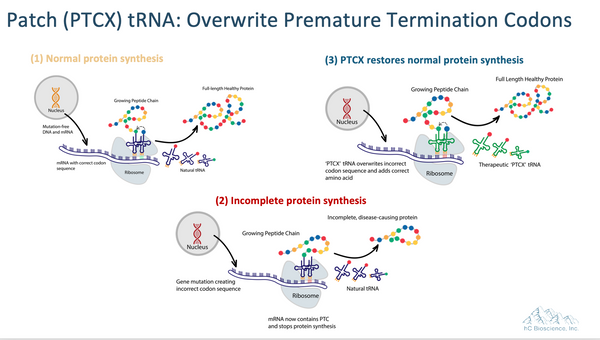Boston, MA, October 20, 2023 -- hC Bioscience Inc. today announced the formation of its oncology clinical advisory board to guide development of the Company’s therapeutic tRNA for the treatment of colorectal cancer that has spread to the liver (CRCLM). The advisory board is comprised of globally recognized translational and clinical researchers with extensive expertise in the areas of gastrointestinal cancer and immunotherapy.
Separately, the Company expanded its medical and regulatory team with the appointments of three advisors, Jose Iglesias, M.D. as consulting Chief Medical Officer, Christine Swenson as Advisor, Regulatory Strategy, and Sharon Tan as acting VP, Program Management.
“We are honored to welcome our world class clinical advisory board as well as the newest members of the medical and regulatory team," said Leslie Williams, CEO and Founder of hC Bioscience. “Together, they will contribute their global expertise in helping us advance a new class of tRNA based therapies in humans for the first time.”
hC Bioscience is developing a family of therapeutic tRNAs called PTCX tRNA. PTCX tRNA is designed to recognize and address premature termination codons in mRNA. Premature termination codons result from gene mutations that cause cells to stop protein production too soon, resulting in truncated proteins that do not function as intended. PTCX tRNA aims to repair these mutations in a codon specific manner and restore the production of native full-length functional proteins.
“tRNA is a promising new class of therapies for targeting colorectal cancers that have metastasized to the liver and are difficult to treat with existing technologies,” said Josep Tabernero, M.D. Ph.D., Vall d'Hebron Institute of Oncology (VHIO), Barcelona, Spain and member of the Company’s oncology advisory board. “Targeting premature termination codons with their PTCX tRNA offers a potentially elegant and powerful therapeutic approach given their prevalence in the APC tumor suppressor gene in colorectal cancer.”
Colorectal cancer is the third most common malignancy worldwide and has a high mortality rate. 70% of CRC are estimated to metastasize to the liver. A major contributor to cancer growth is the loss of function in tumor suppressor genes, that would otherwise produce proteins that prevent cells from growing out of control. In colorectal cancer, the most dominant mutations are those that result in premature termination codons in the APC tumor suppressor gene. 75% of APC mutations are nonsense mutations that PTCX tRNA is designed to repair.
The Company’s oncology clinical advisory board includes the following members:
- Rodrigo Dientsman, M.D. | Group Leader of VHIO´s Oncology Data Science (ODysSey) Group
- David Goldstein, M.D. | Conjoint Clinical Professor, Senior staff specialist in the Department of Medical Oncology at Prince of Wales Hospital
- Scott Kopetz, M.D., PhD. | Deputy Chair for Translational Research, Department of Gastrointestinal (GI) Medical Oncology, Division of Cancer Medicine, The University of Texas MD Anderson Cancer Center
- Tim Price MBBS, FRACP DHlthSc. | Faculty of Health and Medical Sciences, University of Adelaide
- Josep Tabernero, M.D. Ph.D. | Head of the Medical Oncology Department at the Vall d’Hebron University Hospital and former President of ESMO (2018 – 2019)
- John Zalcberg, M.D., Ph.D. | Medical oncologist at Alfred Health and Former Head of the Cancer Research Program in the School of Public Health and Preventive Medicine at Monash University.
Our initial focus is designing and developing therapeutic tRNAs to treat cancers driven by mutations in tumor suppressor genes, as well as inherited diseases. Our lead indications include colorectal cancer that has metastasized to the liver (CRCLM), with additional programs targeting genetic diseases. Therapeutic tRNA represents the next-generation of RNA-based therapies. It holds the potential to repair damaged proteins by modifying errors in mRNA, in a codon-specific, sequence-context-agnostic manner. This means that one single tRNA therapeutic has the potential of addressing multiple disease-causing genes.
hC Bioscience is based in Boston, MA, and was founded on technology out of Universities including Iowa, Wisconsin, Rochester, and Chicago. The Company secured $40 million in series A financing with investments from leading venture firms including ARCH Ventures, Takeda Ventures, 8VC, Taiho Ventures, Panacea Venture, and CureDuchene.











